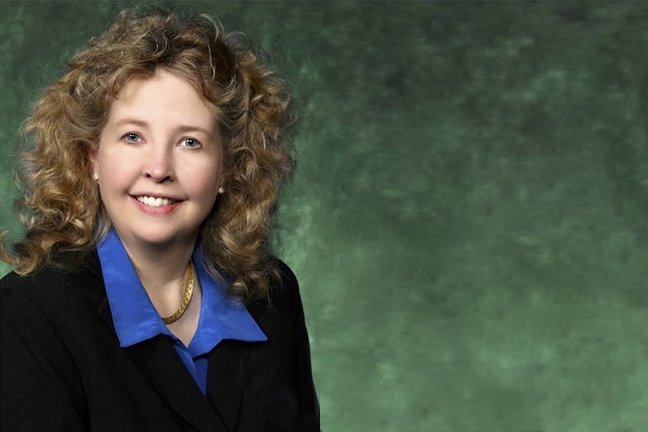Alumna Angela Wilson receives Outstanding Achievement Award

Alumna Angela K. Wilson has received an Outstanding Achievement Award (OAA) from the University of Minnesota. The OAA honors alumni for their unusual distinction in their chosen professions or in public service, and who have demonstrated outstanding achievement and leadership at a community, state, national, or international level.
About Professor Wilson
Wilson earned her doctorate in chemical physics from the University of Minnesota in 1995, under the tutelage of the late Professor Jan Almløf. She earned her Bachelor of Science degree from Eastern Washington University.
She is the John A. Hannah Distinguished Professor of Chemistry at Michigan State University (MSU). The Hannah Professorships are the most important endowed chairs that Michigan State University has to offer. Wilson is also associate dean for Strategic Initiatives in the College of Natural Sciences and director of a new center at MSU—the MSU Center for Quantum Computing, Science, and Engineering (MSU-Q).
Prior to joining MSU in 2016, she was the Regent’s Professor of Chemistry, founder and director of the Center for Advanced Scientific Computing and Modeling, and associate vice provost for faculty at the University of North Texas. Wilson was division director of the National Science Foundation’s Division of Chemistry. She began working full-time at Michigan State University in 2018.
Internationally recognized researcher
Wilson is an internationally recognized researcher in computational/theoretical chemistry. Her primary research focuses on the development and application of quantum mechanical methods.
"Professor Wilson has given her absolute all to science and the success of chemistry."—Professor Joseph Francisco from the University of Pennsylvania.
One of her research areas is the development of the correlation consistent composite approach (ccCA). This method is capable of predicting the thermochemistry of main-group, transition-metal, and lanthanide compounds with an accuracy rivaling that of all but the most sophisticated experimental approaches. Wilson’s ccCA method has exceptionally high utility for investigating the interactions and reactivity of chemical compounds. It has been applied in a studies ranging from the mitigation of CO2 and the identification of protonation sites within DNA (possible trigger sites for cancers) to reactivity in catalysis.
She also works in a broad range of other areas, including the development of new pharmaceuticals and the investigation of important environmental challenges such as the reduction of atmospheric carbon dioxide levels, including a practical test of reductions of CO2 emissions from a power plant at MSU and the impact of emerging contaminants on human and animal health.
Wilson has received many national and international awards for her research accomplishments, including the American Chemical Society Francis P. Garvan-John M. Olin Medal and the International Union of Pure and Applied Chemistry Distinguished Woman in Chemistry award. She is also a Fellow of the American Chemical Society, the American Physical Society, and the American Association for the Advancement of Science. In 2018, she was inducted into the Michigan Women’s Hall of Fame. She has more than 160 peer-reviewed publications.
"Professor Angela Wilson has made contributions of the first importance to the study of compounds containing elements throughout the periodic table," said Professor Katharine Hunt, past chairperson of the Chemistry Department at Michigan State University. "Her methods have brought previously inaccessible compounds into the realm of accessibility for computational work. These methods open new routes for investigations of structure, energetics, catalysis, and materials science. Her studies of carbon sequestration and protein/drug interactions have significant societal impacts."
Dedicated mentor and outstanding leader
Wilson is a dedicated mentor, guiding many undergraduate, doctoral, and postdoctoral advisees, leading to their research recognition and successful careers. She has mentored more than 30 graduate students and 14 postdoctoral associates. She is also promoter of youth, mentoring nearly 100 high schoolers in her research laboratory, with many students winning top national science competitions. In addition, she is an advocate for recognizing women, leading an international recognition program for women in chemistry.
Professor Wilson is an outstanding leader in the national and international chemistry community; she has held multiple leadership positions in the American Chemical Society and other professional societies. In October 2020, Wilson was elected the 2021 American Chemical Society president-elect by members of the ACS. She will serve on the ACS Board of Directors from 2021 through 2023, as president of the society in 2022, and immediate past president in 2023. During her presidential year, Wilson plans to focus on chemistry advocacy, communicating with the public, increasing diversity and inclusion, and strengthening opportunities for the current and future chemistry workforce. She plans to spend next year as president-elect going on an extreme virtual tour, where she will listen to and get feedback from local sections, divisions, and international chapters around the world.
In addition, she has served as chair of the U.S. National Committee for the International Union of Pure and Applied Chemistry (IUPAC), president of IUPAC’s Division of Physical and Biophysical Chemistry, and is serving as a member of the executive committee of the Division of Physical Chemistry of the American Chemical Society. She was elected chair of the Gordon Conference on Computational Chemistry and organized that meeting in 2018. She is chair of the Chemistry Section of the American Association for the Advancement of Science. She has been on the editorial or editorial advisory boards of leading journals in her field, including the Journal of Physical Chemistry, Computational and Theoretical Chemistry, International Journal of Quantum Chemistry. She served as editor of Computational and Theoretical Chemistry for five years. She currently serves on the editorial advisory board for Cell Reports Physical Science and Scientific Reports.
"Professor Wilson has given her absolute all to science and the success of chemistry," said Professor Joseph Francisco from the University of Pennsylvania.